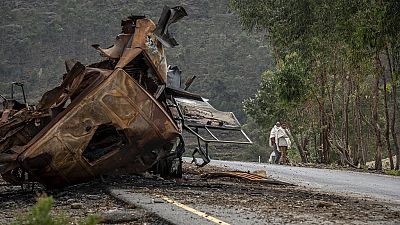Ethiopia
Despite claims by both Ethiopia and Eritrea that they were leaving, Eritrean soldiers are in fact more firmly entrenched than ever in neighbouring Tigray, where they are brutally gang-raping women, killing civilians, looting hospitals and blocking food and medical aid, The Associated Press has found.
Multiple witnesses, survivors of rape, officials and aid workers say Eritrean soldiers have been spotted far from the border in Ethiopia, deep in eastern and even southern Tigray, sometimes clad in faded Ethiopian army fatigues.
Rather than leaving, witnesses say, the Eritrean soldiers now control key roads and access to some communities.
At a hospital in Mekele, capital of Ethiopia's northern Tigray region, children are being treated for horrific injuries of war.
12-year-old Haftom Gebru's hand was too mangled during fighting in his village to be saved.
15-year-old Akhbaret Tadesa has deep trauma after a shell detonated near her house.
It has left her trembling all the time, unable to speak or eat on her own.
Her sister and father care for her around the clock, feeding her, talking to her, holding and squeezing her shaking fingers.
These are the scars of the fighting between Ethiopian armed forces and the Tigray People's Liberation Front.
Since the violence erupted last November, there has been an ever-growing number of war-wounded in Tigray, including women and children.
But many at the hospital say that their wounds were caused not by Ethiopian or Tigray fighters - but by fighters from Ethiopia's one time foe across the border: Eritrea.
Teklemariam Gebremichael is a farmer and says that Eritrean soldiers targeted him for this very reason.
He recounts that he and his neighbours were told that they were no longer allowed to farm.
When Eritrean soldiers came upon him tending to his cattle and harvesting crops, they shot both him and his cows, killing all his livestock.
He survived, but with food now in short supply, his wound is slow to heal.
He appeals for help from the international community.
"They should take immediate action to save the people of Tigray and stand by Tigray, because they are here to ethnically cleanse us," he says.
Health workers say that they have seen a spike in sexual violence too.
Sister Mulu Mesfin is a nurse at the Ayder Referral Hospital in Mekele.
She has treated 400 rape victims and says that the wards are still full to overflowing.
Some of the women who sought treatment said they had been held in camps and gang-raped by dozens of soldiers for weeks.
Some were so badly injured that they were unable to walk, with complications like fistulas and prolapses.
The sister says most of the gang rapes were carried out by both Ethiopian and Eritrean soldiers.
"Most are from Eritreans, but both soldiers are raping," she says.
Compounding the problem, hospitals in the region have been attacked and ransacked.
Some of them were taken over by fighters and turned into garrisons.
As a result, people have to go further and further to get medical care as the hospitals they once went to are no longer able to function.
The Hawzen Primary Hospital still shows signs of an occupation that doctors and patients say was by Eritrean soldiers.
Birhan - who didn't want to give her last name - came to seek treatment for her one-year-old baby, who's been coughing a lot.
She left her two other children at home on their own; she says her husband had fled, as men of fighting age are more likely to be killed by soldiers.
She recalls how Eritrean soldiers took the hospital as a garrison after looting it.
She says the troops forced pregnant women and patients out of the hospital.
"And when women passed by, they would grab and take them in here and rape them," she adds.
An Associated Press team travelling through Tigray this May saw signs of systematic looting of hospitals by what residents said were Eritrean soldiers.
They also witnessed evidence of fighting and military presence on the region's roads.
When the team tried to reach areas that they had heard were being attacked by Eritreans, they were unable to get through.
Aid convoys were also being turned back.
Residents told the AP team that Eritrean soldiers would sometimes wear Ethiopian uniforms, making it impossible to tell them apart.
In a sit-down interview with AP, the Ethiopian government's representative confirmed that Eritreans were in Tigray.
"The intervention of the Eritreans has brought a crisis, more crisis to the region," Abebe Gebrehiwot says.
He stressed that the government was negotiating and expected the Eritreans to leave the region soon.
His words are likely to offer little reassurance to the people of Tigray.
Two million out of Tigray's population of about six million people have been displaced by the fighting.
Many schools have become temporary camps for those who were forced to flee their homes and are still too scared to go home.
Children who should be in school now live with their relatives and neighbours in what were once classrooms.
The violence has already sent families fleeing to places like the camp for the internally displaced in Mekele that Smret Kalayu shares with thousands of others, mostly women and children.
The 25-year-old, who once owned a coffee stall in the town of Dengelat, reflected on her escape in April while Eritrean forces searched houses and “watched each other” raping women of all ages. They also peed in cooking materials, she said.
Many of the displaced told the Associated Press team that they felt that the Eritreans seemed to be settling in for the long term.
In just six months, what was once a prosperous, thriving region has been thrown into crisis.
Ethiopia and Eritrea were deadly enemies for decades, with Tigray’s then-powerful rulers, the Tigray People’s Liberation Front, taking leading roles in a divisive border conflict. That started to change in 2018, after Ethiopian Prime Minister Abiy Ahmed took office and made peace with Eritrea, for which he won the Nobel Peace Prize.
Abiy marginalized the Tigrayan leaders, who fought back by questioning his authority.
In early November the Ethiopian government accused Tigrayan troops of attacking federal ones.
Tigrayan leaders later fired rockets into the Eritrean capital of Asmara, including some that appeared to target the airport there.
Abiy sent federal troops to Tigray to arrest its defiant leaders, and a war broke out that has dragged on for six months and displaced more than 2 million of the region’s 6 million people.
United States Secretary of State Antony Blinken has referred to “ethnic cleansing” in western Tigray, a term for forcing a population from a region through violence, often including killings and rapes.
All sides in the conflict, including Tigrayan fighters, are accused of committing rights abuses.
But most of the atrocities are blamed on Ethiopian forces, allied Amhara militia - and the fighters from Eritrea who appear to be operating with impunity deep inside Tigray.












01:05
Ethiopia's mega-dam on the Nile is "now complete", Prime Minister says
01:49
Ethiopian student's Harvard dream hits an unexpected obstacle
Go to video
Ethiopia's opposition party denounces ban as threat to peace deal
Go to video
Record volume and revenue for Ethiopian coffee exports
Go to video
Kenya set to surpass Ethiopia as East Africa’s largest economy in 2025 – IMF
Go to video
World Food Programme to halt aid for 650,000 women and children in Ethiopia